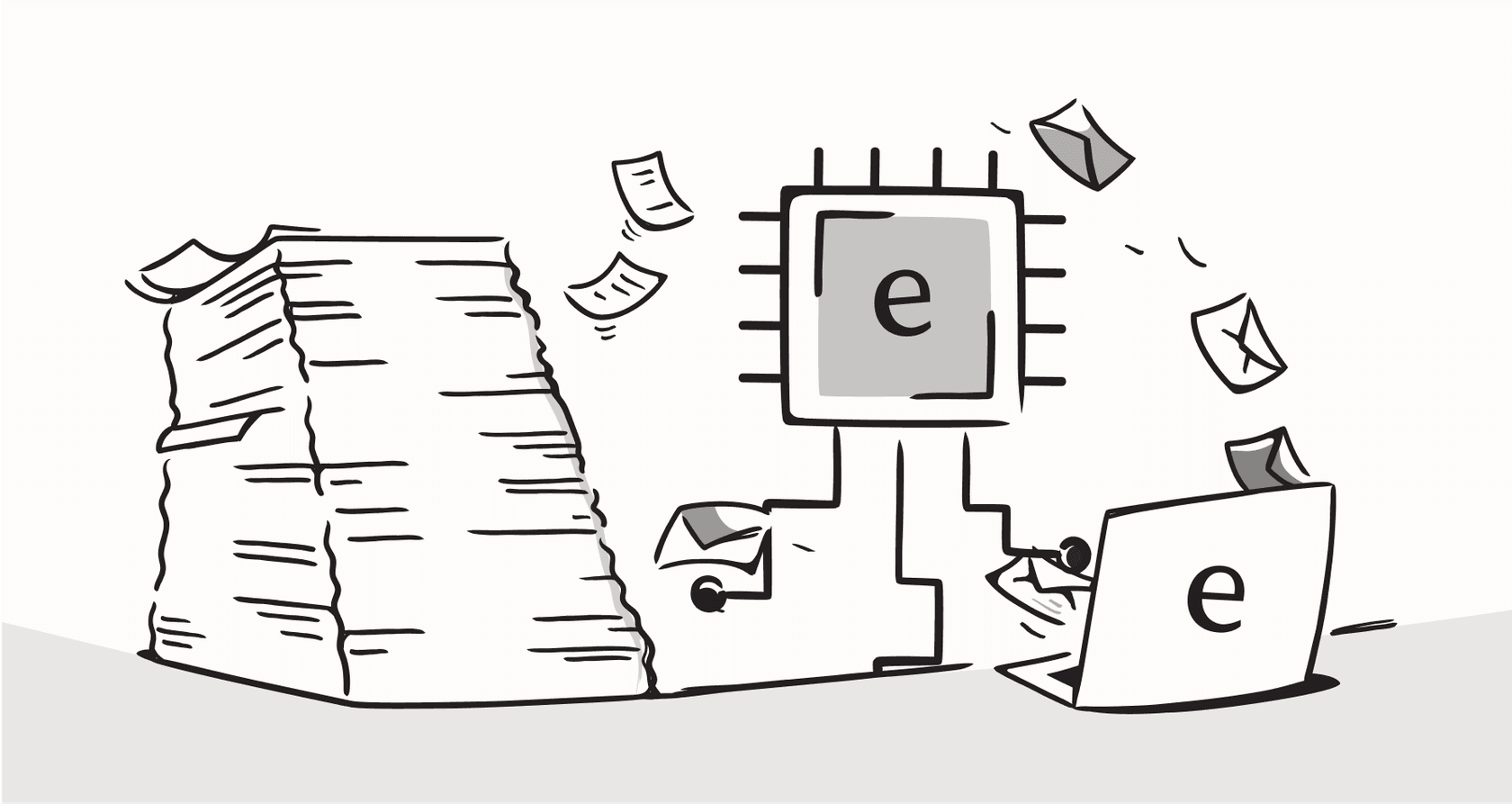
We’ve all been there. You buy a new standing desk, something goes wrong during setup, and you just need a simple answer. But instead, you’re stuck clicking through unhelpful FAQ articles or arguing with a chatbot that can only tell you the company's business hours. All you want to know is how to reset the motor, but you end up wasting 30 minutes before giving up and sending an email you know won’t get a reply for at least a day.
Your customers have definitely been there, too. They want instant, correct answers, but most support teams are drowning in a sea of the same repetitive questions. The old-school chatbots and clunky manual processes just aren't cutting it anymore.
This is exactly the problem autonomous AI support is built to solve. It’s a modern approach that doesn't just answer questions but actually resolves issues from start to finish. It works with the tools you already use and frees up your human agents to focus on the problems that actually require a human touch. This guide will break down what autonomous AI is, how it works under the hood, and how to choose the right platform without the months-long implementation headache.
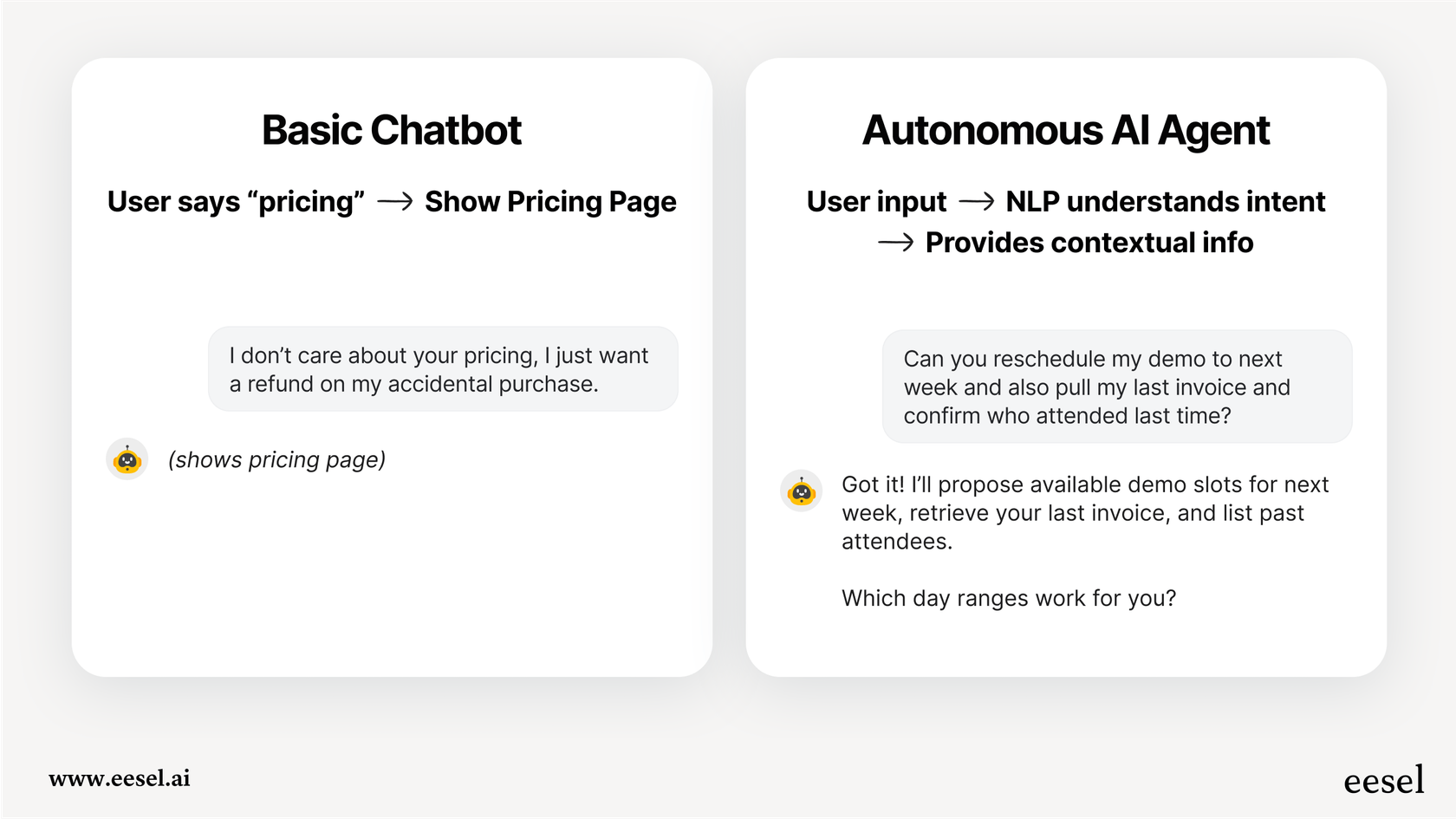
So what is autonomous AI support, really?
Let's get one thing straight: autonomous AI support is a huge step up from the basic chatbots you're probably used to. Those bots are programmed to fetch answers from a knowledge base, and that’s about it. autonomous AI is different. We're talking about AI agents that can actually understand what a customer wants, perform actions across multiple steps, and solve issues entirely on their own.
It’s a big leap from the old way of doing automation, which depended on rigid, rule-based workflows that would break the second a customer phrased a question a little differently. The industry is moving away from that model because it’s just too fragile for the real world. A truly autonomous system learns and adapts as it goes.
Here’s what sets it apart:
- It works on its own to solve problems from beginning to end.
- It learns from new data and every customer conversation.
- It connects deeply with your other business tools to take real action (like checking an order status in Shopify or creating a ticket in Jira Service Management).
- It understands its own limits and knows when to pass a complicated issue to a human agent.
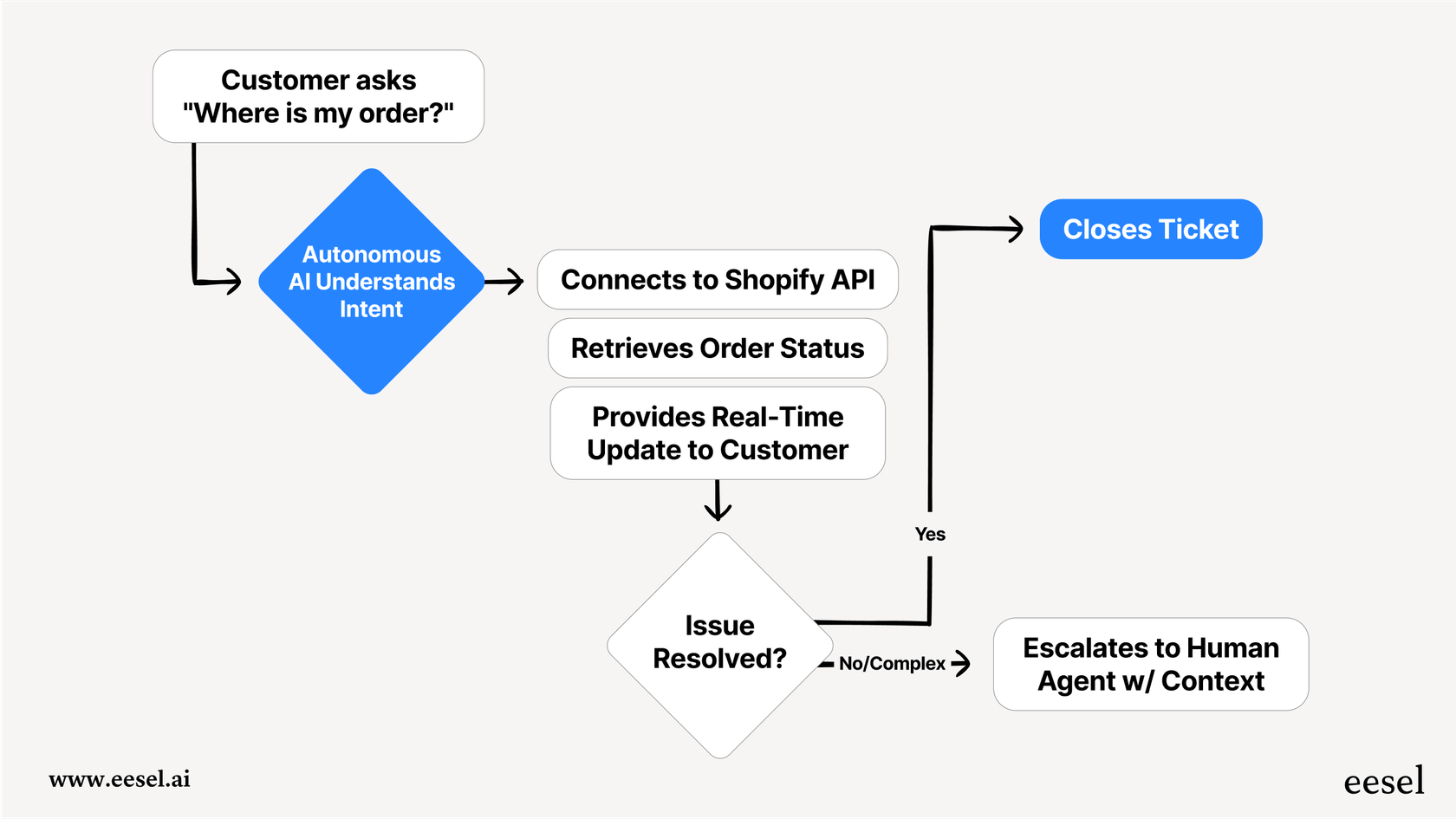
Unlike platforms that make you build out complex workflows, modern solutions can learn directly from your past support conversations to understand context and figure out how problems get solved. This is a core idea behind eesel AI, which is designed to get you up and running in minutes, not weeks.
The foundation: What powers modern autonomous AI support
An AI agent's ability to work "autonomously" is only as good as the knowledge it can access and the tools it can use. If it’s siloed or disconnected, it’s not much better than a glorified FAQ page. Here’s what a truly capable system is built on.
Unifying your scattered knowledge for autonomous AI support
If you’re like most companies, your knowledge is probably all over the place. You have your official help center articles, but there are also internal guides in Google Docs, project specs in Confluence, and team notes in Notion. And, most importantly, you have a goldmine of information locked away in thousands of past support tickets. Traditional bots can only see the official help center, completely ignoring the most valuable source of information you have.
True autonomous AI support systems fix this by connecting to all of your knowledge sources. This lets the AI give nuanced, accurate answers based on what your best agents have said and done in the past. The ability to train an AI on your historical tickets is a massive advantage. For example, eesel AI can analyze your past conversations in Zendesk, Intercom, or Freshdesk to automatically learn your brand voice and common solutions. This means its answers are relevant and sound like you from day one. It can even spot gaps in your official knowledge base and draft new articles based on successful resolutions.
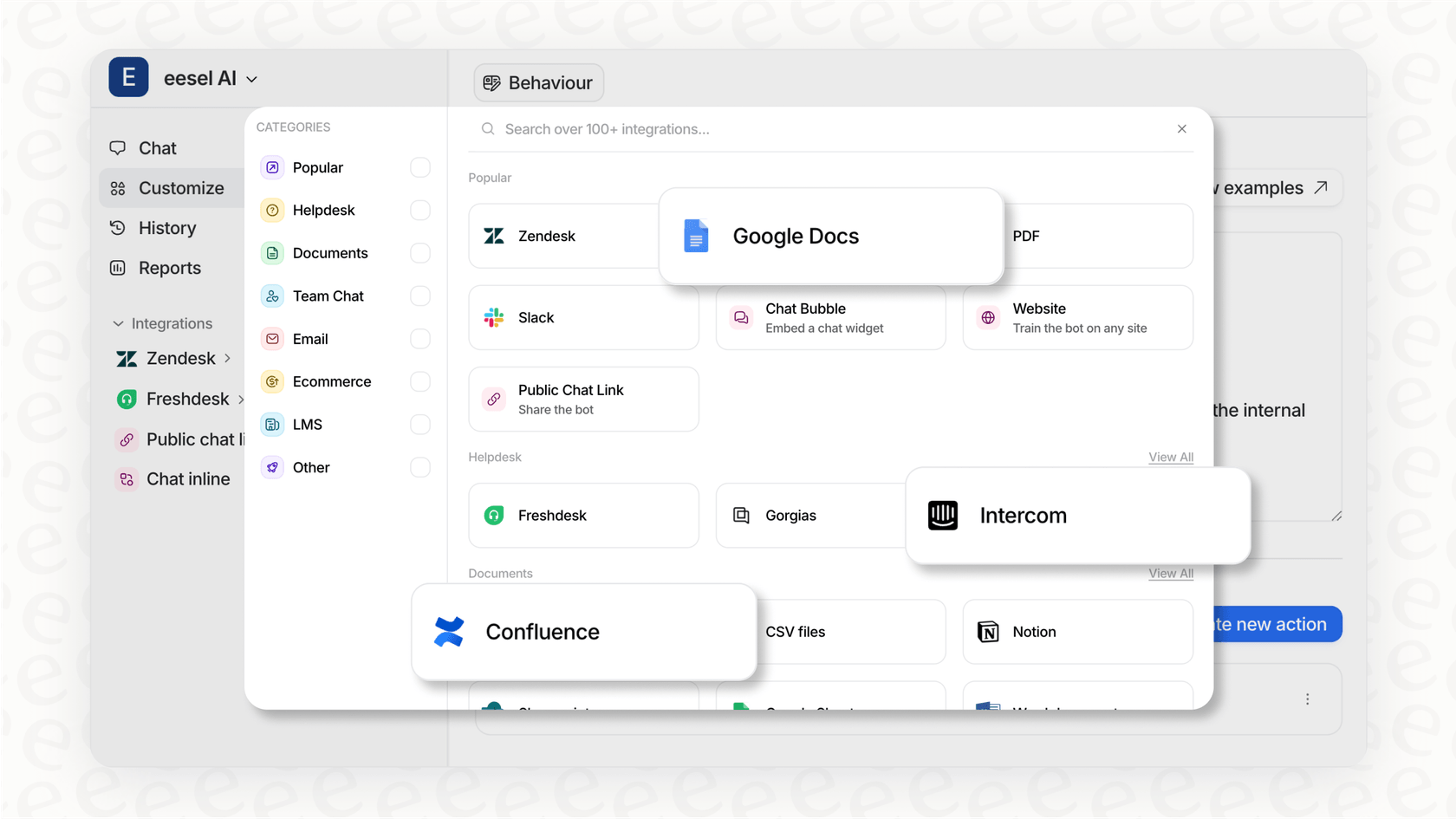
Seamless integration for AI support without the 'rip and replace'
Here’s a not-so-secret secret about many older AI vendors: their "solution" requires you to either move your entire support operation to their platform or kick off a complicated, developer-heavy integration that takes months. This forces your team to learn new tools, messes up your existing workflows, and adds a ton of unnecessary risk.
A modern autonomous AI platform should work differently. It should be an intelligent layer that sits right on top of your existing helpdesk, plugging into the tools your team already uses every day. Look for solutions that offer one-click integrations. With eesel AI, you can connect your helpdesk in minutes without writing a single line of code. Your team can keep working in Zendesk, Freshdesk, or Gorgias while the AI handles frontline support, drafts replies, and triages tickets, all within the workflow you already have.
How autonomous AI support takes action to resolve issues instantly
Answering a question is one thing, but actually resolving an issue is what counts. autonomous AI support isn't just a Q&A machine; it's a doer. To be genuinely helpful, it needs the ability to perform actions that solve the customer's problem on the spot.
A few examples of these actions include:
- Looking up an order status from Shopify.
- Updating a ticket field in Zendesk.
- Tagging and routing a ticket to the right team.
- Escalating to a specific agent with the full conversation history.
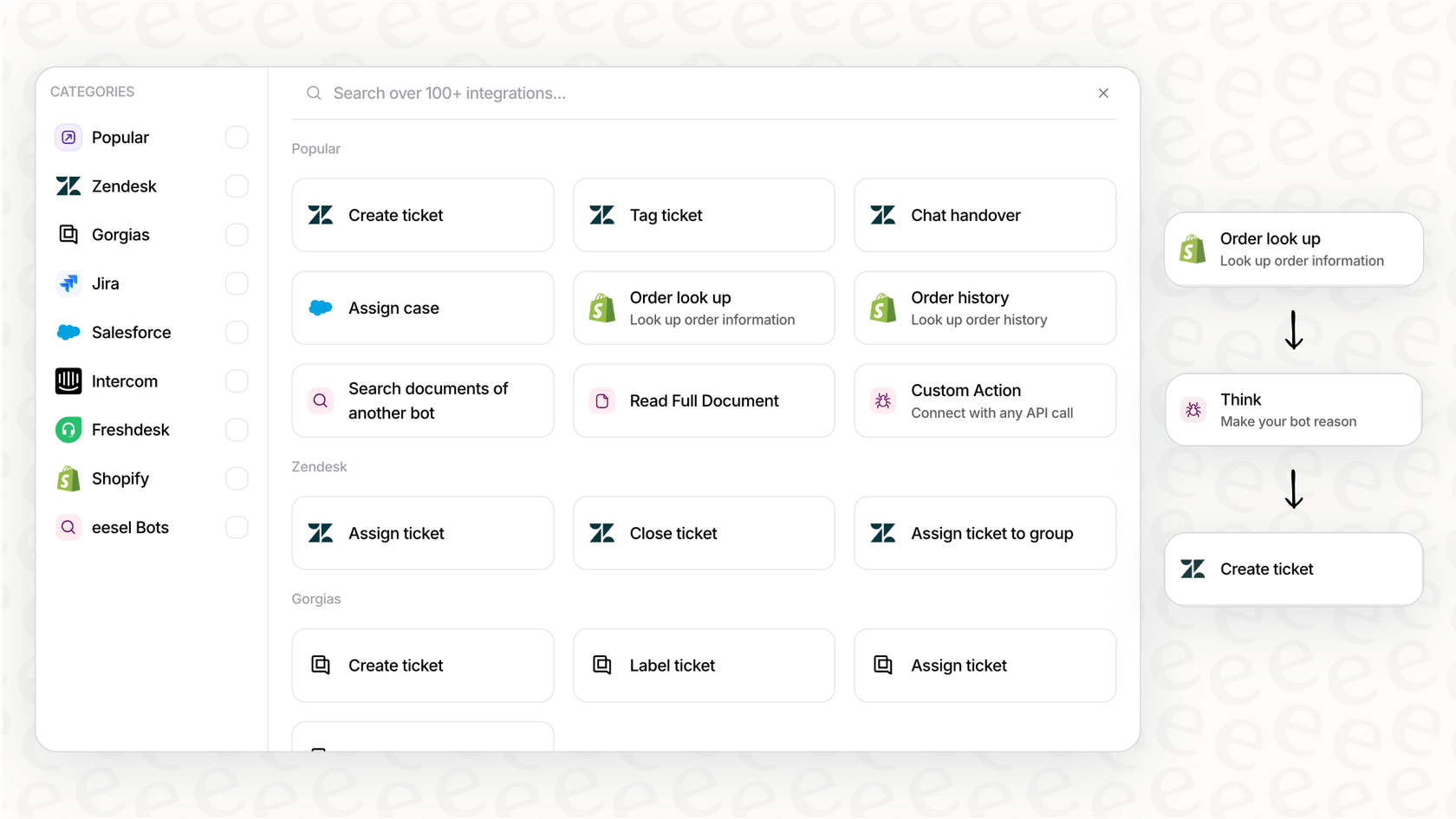
This is where customizable AI actions become so important. Instead of being stuck with a limited set of built-in capabilities, platforms like eesel AI let you set up custom actions using APIs. This allows your AI agent to securely pull information from any of your internal systems to provide real-time, accurate fixes that actually help your customers.
Choosing the right platform for autonomous AI support
Not all AI solutions are built the same. As you look at your options, there are a few critical, non-negotiable features a modern platform needs to have to be worth your time.
The importance of a self-serve, rapid setup for autonomous support
Too many people get stuck in endless sales calls, mandatory demos, and long onboarding processes just to see if a tool is a good fit. This can waste weeks or even months.
You should be looking for a platform that is truly self-serve, where you can sign up, connect your helpdesk, and see the AI working with your own data in minutes. You should be in the driver's seat from the very beginning. This simplicity is a core part of how we think at eesel AI. You can set up and launch your AI agent entirely on your own, without ever talking to a salesperson. That level of transparency and ease of use is a real departure from the old-school, gatekept enterprise software model.
Why your AI support needs simulation and a gradual rollout
Going all-in on full automation from day one is a pretty big risk. What if the AI gives the wrong answers, misunderstands a customer, or just creates a bad experience? You need a way to de-risk the whole process.
The answer is a platform that lets you test with confidence. You should be able to simulate the AI's performance on thousands of your past tickets in a safe environment. Before you go live, eesel AI lets you run a simulation to see exactly how it would have handled past customer questions. You get detailed reports on how many issues it could have resolved and can tweak its behavior and prompts. Once you feel good about it, you can roll it out gradually. For example, you could start by having it only handle specific ticket types (like "order status" questions) or only respond to 10% of incoming queries, escalating the rest.
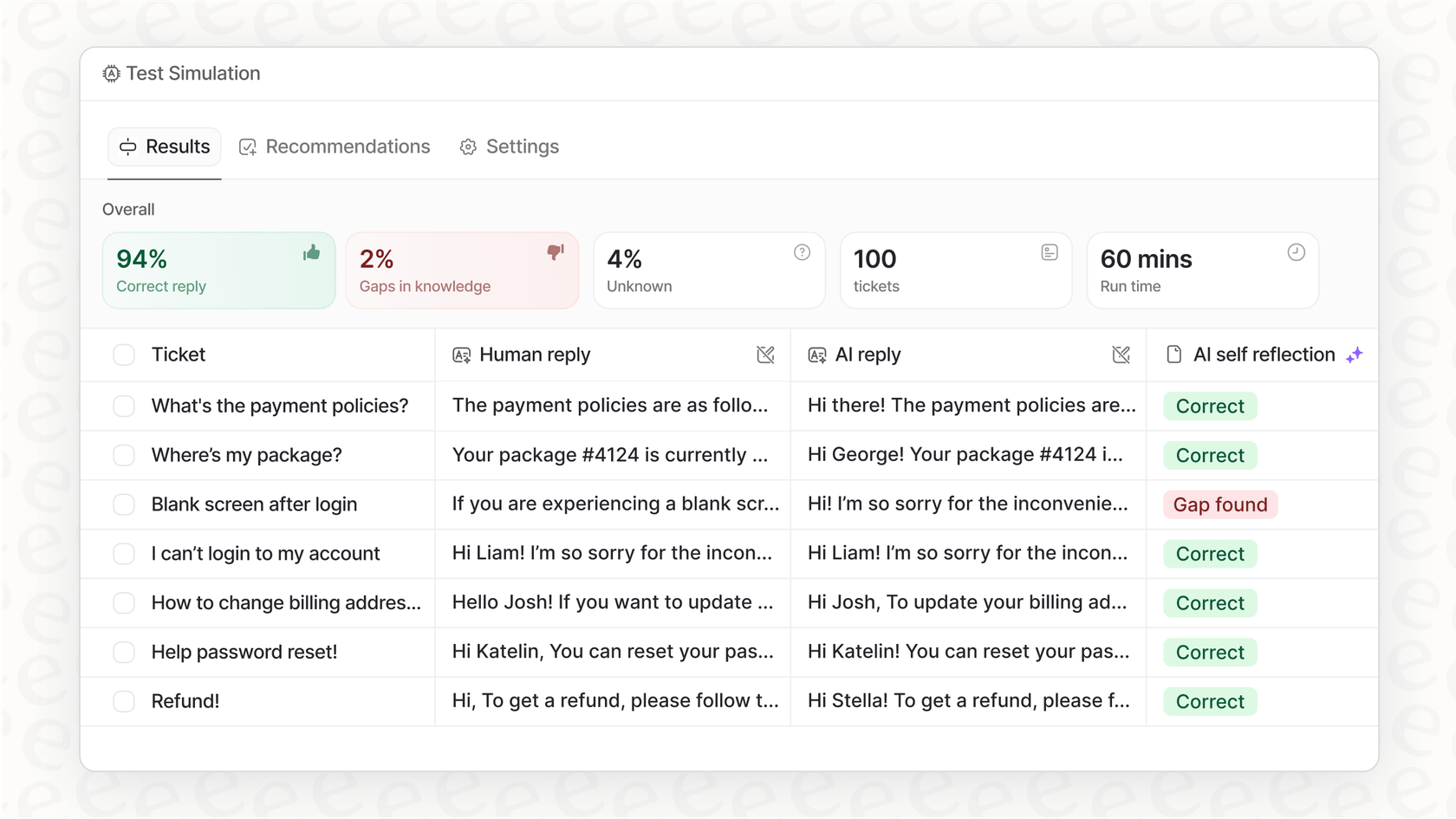
The hidden trap of 'per-resolution' pricing
Many AI vendors use a consumption-based pricing model where they charge you for every ticket the AI resolves. This leads to completely unpredictable costs and, honestly, it punishes you for being successful. A busy month for your business could lead to a shockingly large bill, making it impossible to budget.
A much better model is transparent, predictable pricing based on the features you need, not on how many tickets you deflect. You want a partner in efficiency, not a vendor that makes more money when your ticket volume spikes. eesel AI offers clear, flat-rate pricing with no per-resolution fees. This keeps your costs predictable and ensures you aren't penalized for scaling your support. You can find plans that you can even pay for month-to-month and cancel anytime, which is a level of flexibility you don't often see.
| Feature | Per-Resolution Model (Most Vendors) | Flat-Rate Model (eesel AI) |
|---|---|---|
| Cost Predictability | ❌ Low (costs scale with ticket volume) | ✅ High (fixed monthly/annual fee) |
| Incentive Alignment | Misaligned (vendor profits from your volume) | ✅ Aligned (partner in your efficiency) |
| Budgeting | ? Difficult and prone to overages | ? Simple and straightforward |
| Transparency | ? Often includes hidden fees or tiers | ✨ Transparent with no surprises |
Getting started with autonomous AI support
Moving to autonomous AI support is about getting real resolutions for your customers, not just spitting out answers. A great system should plug into your existing tools, learn from all your data, and be incredibly easy to test and deploy.
Here are a few practical steps to get you started:
- Find your high-volume, repetitive tasks: Start by looking at your support tickets. What are the top 5-10 questions your team answers again and again? Things like "Where is my order?," "How do I reset my password?," or "What's your return policy?" are common culprits.
- Get your knowledge in order: Figure out where all your key information lives. Make sure your most important documents and your helpdesk are ready to be connected to the AI.
- Pick a platform built for simplicity and control: Prioritize a self-serve tool that offers solid simulation features and transparent, predictable pricing. Don't get locked into a long-term contract before you've seen the value for yourself.
Pro Tip: Don't try to automate 100% of your support on day one. Start with the top 10-20% of your most common questions. This will give you a quick, measurable win, build confidence on your team, and show a clear return on investment that makes it easier to expand later.
Switching to autonomous AI support doesn't have to be some massive, six-month project. With a platform like eesel AI, you can have an AI agent trained on your unique data and handling real customer tickets this week. It’s built to give you total control, so you can automate with confidence and scale at a pace that makes sense for you.
Ready to see what it can do? Start your free trial with eesel AI or book a demo with our team to learn more.
Frequently asked questions
Modern platforms are built for speed and simplicity. With a self-serve tool, you can connect your helpdesk and other knowledge sources in minutes, not months, without needing help from a developer.
It's a significant step up from traditional chatbots. While most bots just fetch articles from a knowledge base, autonomous AI can perform multi-step actions, integrate with business tools to resolve issues, and learn continuously from every interaction.
A key feature of a truly autonomous system is knowing its own limits. It can identify complex, sensitive, or new issues it hasn't seen before and will intelligently route them to the right human agent with the full conversation context.
Not at all. The goal is to free up your human agents from handling repetitive, simple questions so they can focus their time on high-value, complex customer issues that require a human touch. It's about augmenting your team, not replacing it.
The best platforms let you de-risk the process entirely. Look for a simulation feature that shows you how the AI would have handled thousands of your past tickets, allowing you to test and fine-tune its performance in a safe environment before activating it for customers.
Unlike basic bots, a true autonomous system integrates with all your knowledge sources, from help articles and internal docs to past support tickets. This allows it to give comprehensive, accurate answers based on the full scope of your company's expertise.
Share this post

Article by
Kenneth Pangan
Writer and marketer for over ten years, Kenneth Pangan splits his time between history, politics, and art with plenty of interruptions from his dogs demanding attention.



